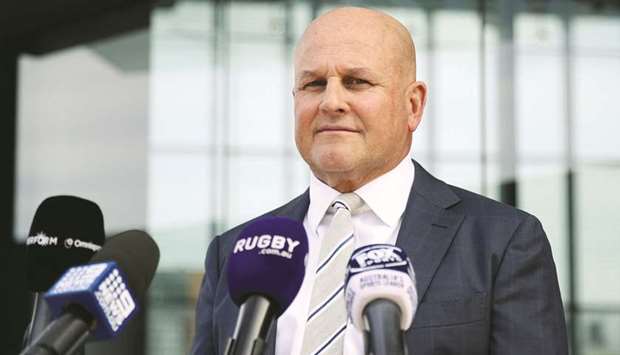Australian rugby officials have set a three-week deadline for New Zealand to accept their demands for a trans-Tasman Super Rugby competition, or they will walk away and set up a domestic tournament.
Rugby Australia interim chief executive Ron Clarke said the issue had gained added urgency because talks with broadcasters over rights to the 2021 season were due to open early next month. “We’ve put a deadline on broadcast submissions of September 4, that’s three weeks away... so D-Day’s coming,” he told reporters.
Clark had a blunt message for New Zealand administrators: “The clock is ticking on the whole Super Rugby model for 2021.”
Tensions between Rugby Australia and New Zealand Rugby have been high since the Kiwis released a blueprint last month for a radical shake-up of the southern hemisphere competition in response to the coronavirus pandemic.
Aside from jettisoning South African teams and Argentina’s Jaguares, it also had room for only between two and four of Australia’s Super Rugby teams, which Rugby Australia deemed unacceptable.
Australia want the inclusion of all five sides contesting Super Rugby AU, the domestic competition established after the Super Rugby season was suspended.
The situation has prompted sniping from both sides of the Tasman, with Rugby Australia chairman Hamish McLennan describing the New Zealand-Australia relationship as “a bit master-servant” in favour of the Kiwis.
When New Zealand asked for expressions of interest from Australian sides for its competition, Rugby Australia officials reportedly described the demands as “expressions of insolence”.
The New Zealanders have questioned Australian rugby’s player depth and whether it deserves five sides, with All Blacks coach Ian Foster remarking “we’re not a charity”.
After a slow start compared to its New Zealand domestic counterpart, Clarke argued Super Rugby Australia had hit its stride recent weeks, underlining the case for five teams.
“We’re increasingly buoyed by the quality of the games we’re starting to see in our competition,” he said.
“We’re seeing how much rising talent is coming through in our young players and how this competition is starting to engage fans.”
Clarke said Rugby Australia preferred a trans-Tasman model but, if it could not get five teams, was confident in proceeding with a domestic competition.
He said an Australian competition could look at inviting teams from Japan or the Pacific island to join in future years.
New Zealand Rugby declined to comment.
Clubs face major financial issues if fan ban remains: Exeter chairman
Clubs in the English Premiership could go bust if fans are not allowed into stadiums by the end of the year, Exeter Chiefs Chairman Tony Rowe has said. The Premiership, which has been suspended since March, will resume later this month but games will be played without fans as part of measures to curb the spread of the novel coronavirus. The Chiefs, one of the few clubs to have consistently posted profits in the last few years, were losing more than 1 million pounds ($1.31 million) each month, Rowe said. “I don’t think the rugby fraternity realise how much clubs are losing,” he told British media. “We still have to maintain all the infrastructure, as well as the playing side, so it’s been incredibly difficult. Most of the clubs will have worked out how long they can survive but, if we can’t get some decent revenue coming in by the new year, we’ve got serious problems. At Exeter ... we’re fortunate we’ve been able to lean back on some of our assets to help raise the funds we need to keep going, but I do fear for some of the other clubs.” Rowe said clubs had been hit particularly hard by the loss of matchday revenue. “Central funding is made up of TV, league sponsors and RFU money. However, the bigger money comes from bums on seats and if we can’t get spectators into the stadium, we’re all going to be in trouble,” he added.

Interim Rugby Australia CEO Rob Clarke. (Reuters)
